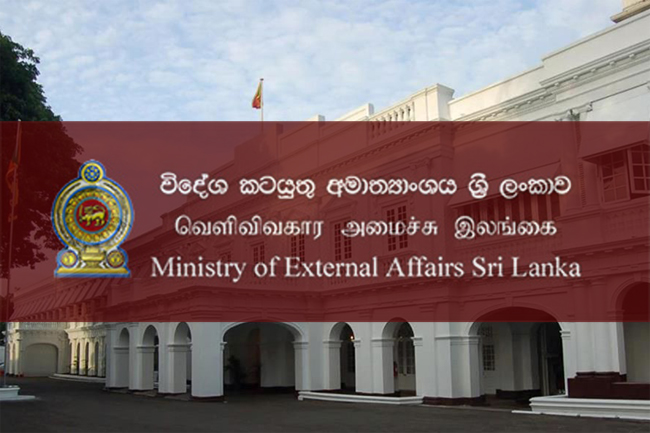Response to the Human Rights Watch “World Report 2022”: Sri Lanka Section
Sri Lanka Foreign Ministry has noted with regret that the Sri Lanka section of the Human Rights Watch HRW “World Report 2022” depicts an exaggerated and unduly negative picture of the current human rights situation in the country.
Sri Lanka follows a policy of constructive engagement with the international community including with international NGO’s such as HRW on matters related to human rights, and we recognize their constructive role as human rights defenders. However sensationalized and biased reporting during a particularly challenging global economic and social environment risks igniting and aggravating domestic discord. We highlight the importance of responsible, balanced and impartial reporting.
At the Human Rights Council in Geneva in September last year Foreign Minister Prof. G.L. Peiris stated that Sri Lanka is engaged in pursuing sustainable peace, through an inclusive, domestically designed and executed reconciliation and accountability process. Sri Lanka also reiterated its long standing commitment to the promotion and protection of human rights in line with our own constitution and our international obligations.
This message was reiterated recently by the President at the opening of the 9th Session of the Parliament of Sri Lanka on 18 January, 2022.
The Government of Sri Lanka remains accountable to its people in discharging its mandate on all fronts including economic, social and human development as well as the achievement of the SDGs. At the same time and despite operational, economic and human constraints caused by the Covid-19 pandemic, the Government has made important progress in delivering on post-conflict reconciliation, accountability and human rights as undertaken before the people of Sri Lanka and reiterated internationally. The work of the independent domestic institutions – the Office of Missing Persons, the Office of Reparations, the Human Rights Commission of Sri Lanka, the Office of National Unity and Reconciliation and the Sustainable Development Council of Sri Lanka is an important supportive pillar of this effort. We have empowered these institutions with financial and other support in order to execute their independent statutory mandates. Regular updates related to progress made through these domestic processes on human rights and reconciliation are contained in Sri Lanka’s statements to the Human Rights Council in Geneva.
In our response to HRW we have highlighted the progress made in recent months relating to a number of areas addressed by them such as amendment to PTA, accountability, release of detainees under PTA, freedom of association, the Covid pandemic and the proposed amendments to the Muslim Marriage and Divorce Ordinance.
We have also stated that with regard to international actors, the Government greatly values the goodwill and advice from our international partners, the United Nations as well as local and international NGOs. We have continued our ongoing interaction with them and encouraged regular engagement with Sri Lanka.
During numerous such exchanges including from visiting bilateral dignitaries as well as senior officials from the United Nations and UN human rights special mandate holders, we have facilitated access to all domestic interlocutors and been open to their encouragement, advice and concerns. We value in particular our interaction with our domestic civil society partners given their established outreach and expertise on many issues related to development reconciliation and human rights. We have engaged them in our efforts to realize the SDGs as well as on matters related to reconciliation. On a broader front, Sri Lanka has also invited the Sri Lankan diaspora groups to partner with us as we move forward.
With regard to Sri Lanka`s position at the Human Rights Council, as we have stated at the September 2021 session of the Council , Sri Lanka will continue its long-standing cooperation with the United Nations human rights mechanisms as well as with the Council . We are delivering on our commitment to address accountability and reconciliation through domestic processes and institutions. As stated by Foreign Minister Prof. G.L. Peiris “We are open in acknowledging our challenges and as a responsible and democratic government, we are committed to achieving tangible progress on the entire range of issues relating to accountability, reconciliation, human rights, peace and sustainable development”. Sri Lanka is of the view that the evidence gathering mechanism that was contained in Resolution 46/1 and which led to division in the Council is unwarranted and unhelpful and will lead to politicization and polarization in Sri Lanka.
Source – Foreign Ministry Colombo

